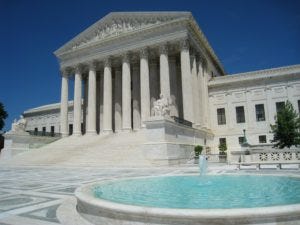Charging Foreign Officials Who Take Bribes with Conspiracy to Violate the FCPA
The Foreign Corrupt Practices Act prohibits U.S. persons and companies from paying bribes to foreign officials to obtain or retain business. The statute applies only to those who pay the bribes, not to foreign officials who receive them. But a recent Supreme Court decision may revive a long-dormant legal theory: charging foreign officials with conspiracy to violate the FCPA. Congress passed the FCPA in 1977 to combat U.S. companies participating in foreign corruption. In recent years FCPA enforcement has become a major priority for the Department of Justice and the SEC. FCPA cases have resulted in some of the largest criminal and civil fines in history. And although private citizen Donald Trump criticized the law in the past, Attorney General Sessions recently affirmed the Trump administration remains committed to its enforcement. The FCPA is an unusual corruption statute in at least one respect. Bribery laws generally apply to both sides of a corrupt transaction, prohibiting the receipt of bribes by a public official as well as the payment of those bribes. The FCPA, by contrast, applies only to the bribe payer. Foreign officials who receive bribes may be subject to prosecution in their own country, but the language of the FCPA does not prohibit their actions. Forty years after the FCPA’s passage, the economy is more global and interconnected than ever. DOJ is much more aggressive about asserting criminal jurisdiction over events that take place primarily in other countries. There are cases where DOJ may want to charge the foreign official accepting FCPA bribes. This may be particularly true when the official has extensive ties to and activities within the United States, or when prosecution in the official's own country seems unlikely. Because the FCPA does not apply to the bribe recipients, DOJ must look to other theories to hold them accountable. For example, in some recent cases DOJ has charged foreign officials with money laundering of funds received as part of an FCPA scheme. But DOJ may have a more direct option: charging foreign officials who receive bribes with conspiracy to violate the FCPA. Conventional wisdom has been that such conspiracy charges are improper. This is based in large part on a single 1991 Court of Appeals case, United States v. Castle. But a recent Supreme Court decision casts doubt on Castle and may breathe new life into the conspiracy theory.

The Conspiracy Precedent: United States v. Castle
There was a time when DOJ believed it could charge foreign officials with conspiracy to violate the FCPA. In Castle the government used that theory to prosecute four individuals – two U.S. citizens and two Canadian officials. The Americans had allegedly paid the Canadians a $50,000 bribe to secure a contract to provide buses to the Saskatchewan government. The conduct of the Americans plainly fell within the statute. But the Canadian defendants claimed they could not be charged with conspiracy to violate the FCPA. They argued the conspiracy charge was an improper attempt to circumvent Congress’s decision not to criminalize the foreign officials's conduct. The U.S. Court of Appeals for the Fifth Circuit agreed. The court said Congress knew any FCPA bribery transaction would necessarily involve a foreign official. But Congress chose not to criminalize the receipt of the bribe. Prosecuting foreign officials for conspiracy, the court held, would amount to an improper end run around this Congressional policy decision.
The Mann Act and Gebardi v. United States
The Castle court relied primarily on a 1932 Supreme Court case, Gebardi v. United States. Gebardi involved a prosecution under the Mann Act, which prohibited the transportation of women across state lines for “immoral purposes.” The Mann Act punished those doing the transporting but did not criminalize the actions of the woman being transported. In Gebardi a woman agreed to cross state lines with her lover to have sex. When they were charged with conspiracy to violate the Mann Act, she argued the charge was improper. She noted that Congress deliberately chose not to criminalize her conduct in the Mann Act itself. To allow a conspiracy charge, she claimed, would subvert this Congressional decision. The Supreme Court agreed and dismissed the conspiracy case. The Castle court held that the reasoning of Gebardi squarely applied to the FCPA. Failing to criminalize the receipt of bribes by foreign officials, the court said, represented “an affirmative legislative policy to leave unpunished a well-defined group of persons who were necessary parties to the acts constituting a violation of the substantive law.” Given that legislative decision, it was improper for prosecutors to use conspiracy to charge the foreign officials that the FCPA left unpunished.

Conspiracy and Ocasio v. United States
Since 1991 Castle has been widely cited for the proposition that it’s improper to charge foreign officials with conspiracy to violate the FCPA. But the Supreme Court’s decision last term in Ocasio v. United States suggests the high court would not agree. In Ocasio the defendant was a Baltimore police officer. He, some fellow officers, and the owners of an auto garage took part in a scheme in which the garage owners paid the officers to refer car accident victims to the garage for repairs. Officer Ocasio and the garage owners were charged with conspiracy to violate the Hobbs Act. That act prohibits extortion “under color of official right” by a public official. This is a common federal corruption charge, particularly in cases involving state or local officials. In Evans v. United States the Supreme Court held that extortion under color of official right is basically equivalent to the receipt of a bribe. But the Hobbs Act applies only to the public official, not to the person who pays. So as interpreted by Evans the Hobbs Act, like the FCPA, is an odd bribery statute: it prohibits only one side of a two-sided corrupt transaction. In Officer Ocasio’s case, that meant prosecutors couldn’t charge the garage owners with violating the Hobbs Act directly. So they charged the garage owners and the officers with conspiracy to violate the Hobbs Act. The government’s theory was that although the garage owners could not violate the Hobbs Act, they were still capable of conspiring to help the officers violate it. In effect, the garage owners were charged with conspiring to help the police officers extort money from the garage owners themselves. Ocasio argued the conspiracy charge was improper. Part of his argument was similar to that made by the defendant in Gebardi. Although every Hobbs Act extortion case necessarily involves at least two parties, Congress expressly chose not to punish the person who pays the public official. Prosecuting the payer for conspiracy to violate the Hobbs Act, Ocasio argued, would undermine this Congressional decision.

The Supreme Court on the Nature of Conspiracy
The Supreme Court disagreed with Officer Ocasio. The Court relied on basic principles of conspiracy law. It noted that conspiracy has always been a separate offense from the underlying crime. In a conspiracy charge, the crime is the agreement itself – the joint undertaking to engage in criminal activity. Conspiracy does not require that the co-conspirators successfully commit the crime that is the object of the conspiracy. It does not require that each co-conspirator agree to commit or facilitate each and every element of the underlying crime. In fact, a conspirator may be convicted even if he was legally incapable of committing the underlying offense. Conspirators need only agree to help some member of the conspiracy commit the crime. In Ocasio’s case, the garage owners conspired with the police officers to help the officers violate the Hobbs Act. The Court held this conspiracy theory was sound even though the garage owners, who were not public officials, would be legally incapable of committing extortion under color of official right: “It is sufficient to prove that the conspirators agreed that the underlying crime be committed by a member of the conspiracy who was capable of committing it. In other words, each conspirator must have specifically intended that some conspirator commit each element of the substantive offense.”
The Mann Act Precedents
The Ocasio Court also discussed Gebardi, as well as an even earlier Mann Act case, United States v. Holte (1915). In Holte the Court rejected the claim that it was impossible for the woman transported across state lines to be guilty of conspiracy to violate the Mann Act. The Court gave an example of a prostitute who buys the train tickets, arranges for the travel, and then crosses state lines with a companion. In such a case, the Court said, there was no reason the woman could not be charged with conspiracy even though the terms of the Mann Act did not cover her conduct. The Court in Ocasio concluded Holte and Gebardi mean that merely participating in a two-sided transaction will not always be enough to charge the person not covered by the statute with conspiracy. However, there could be cases where the active participation of the other party would rise to the level where a conspiracy charge would be warranted. Gebardi, the Court held, rejected the conspiracy charge not because it was inherently improper but simply because there was no evidence that the woman in that case had actually joined the conspiracy. The Court concluded: “Holte and Gebardi make perfectly clear that a person may be convicted of conspiring to commit a substantive offense that he or she cannot personally commit. They also show that when that person's consent or acquiescence is inherent in the underlying substantive offense, something more than bare consent or acquiescence may be needed to prove that the person was a conspirator.”
Charging Foreign Officials with Conspiracy to Violate the FCPA
Ocasio suggests the current Supreme Court would not agree with the Castle court’s reading of Gebardi. Like the FCPA, the Hobbs Act expressly fails to criminalize the acts of one of the two necessary parties in a criminal transaction. The court in Castle held that this Congressional judgment meant a conspiracy charge would always be improper. But the Supreme Court in Ocasio rejected a similar claim. Castle essentially concluded that Congress’s failure to include foreign officials in the FCPA immunizes those officials from any FCPA-related charge, even under separate statutes. The current Supreme Court is unlikely to be sympathetic to that argument. If Congress wants to pass a statute prohibiting any charges of any kind against foreign officials who accept bribes, it is free to do so. But the Court is unlikely to infer such a broad policy decision from the silence in the FCPA. It is much more likely to find, as it did with the Hobbs Act, that nothing in the FCPA alters the basic law of conspiracy. This suggests DOJ could properly charge a foreign official who receives bribes with conspiracy to violate the FCPA. The theory would be that the foreign official conspired to help U.S. persons violate the FCPA by bribing that official. Just as the garage owners in Ocasio conspired to help others extort money from the owners, foreign officials could conspire to help others pay bribes to the foreign officials. This charge would be most appropriate where the foreign official was aggressively encouraging the bribes. As the Court noted in Ocasio, something more than mere passive participation likely would be required to find the officials guilty of a conspiracy. But if they were actively engaged in the scheme, a conspiracy charge may be warranted. In a case where the foreign official is aggressively demanding bribes, punishment of the official may be particularly justified. The bribe payers arguably are being “shaken down.” They may feel they have little choice but to pay. Charging only the bribe payers in such a case is akin to charging only the victims of extortion in a Hobbs Act case – it may let the most culpable party off the hook. Of course, cases where DOJ is interested in prosecuting the foreign official may be relatively rare. Where the official is more of a passive recipient, conspiracy charges may not be warranted. In many cases diplomatic, jurisdictional, evidentiary, or other concerns will counsel against filing charges. But in appropriate cases, DOJ should consider charging foreign officials who accept bribes with conspiracy to violate the FCPA. Ocasio suggests the Department’s legal position more than twenty-five years ago in Castle was correct: conspiracy is a separate crime and there is no barrier to prosecution. Click here to join the Sidebars mailing list and receive e-mail notification of future posts.



